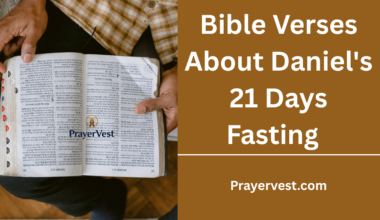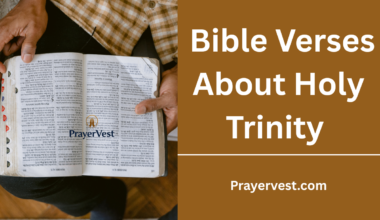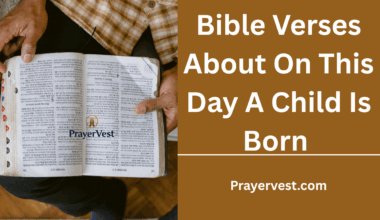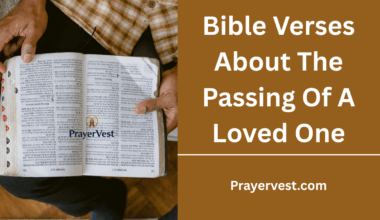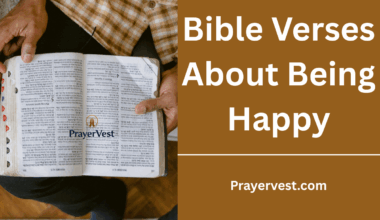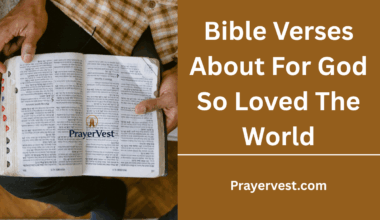Since ancient times, music has been an essential component of human expression, acting as a medium for worship, narrative, and emotion. According to the Bible, music is more than just entertainment; it is a potent way to communicate with God, show appreciation, and find comfort during happy or sad times.
Scripture portrays music as a heavenly gift that uplifts the spirit and fortifies faith, from the poignant psalms of David to the prophetic songs of praise. Its melodies and rhythms have spiritual meaning and have the power to alter, unite, and inspire devotion in listeners.
The Scriptures teach that music is more than an art form; it is a spiritual practice and an act of worship. Singing, playing instruments, and making melody in the heart are continually encouraged as means to worship God and foster a greater relationship with Him.
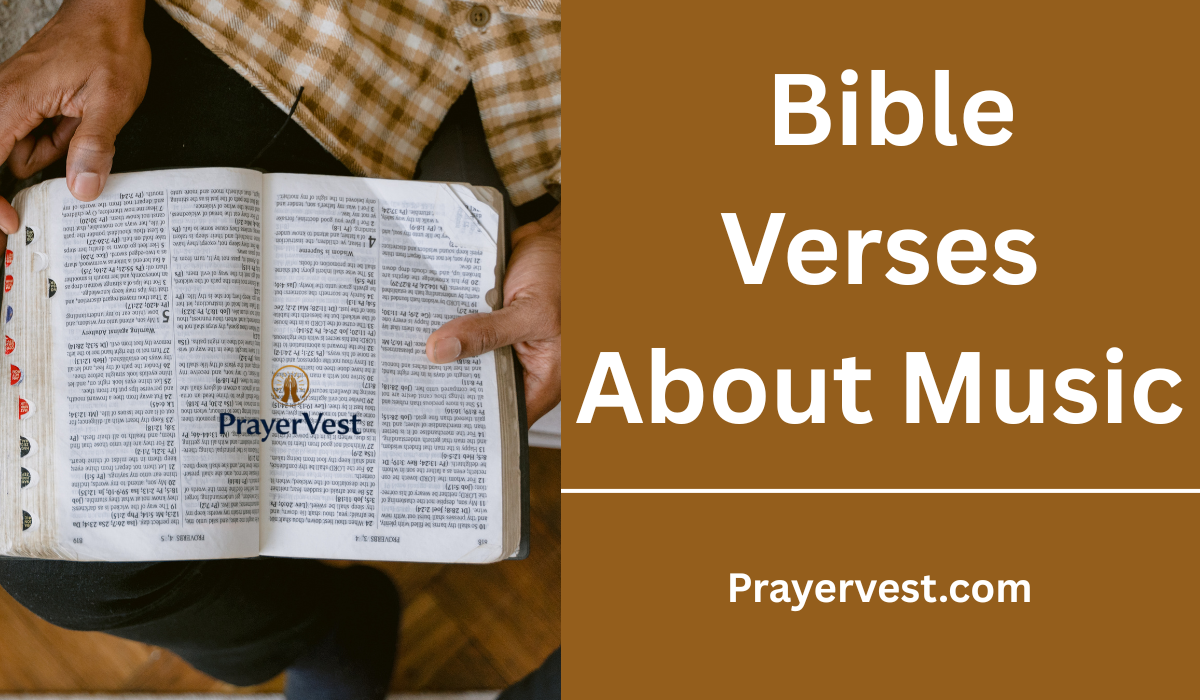

Prayers, festivities, triumphs, and even moments of mourning are all accompanied by music, proving its adaptability as a vehicle for believers to convey a wide spectrum of human and spiritual experiences. The devout are reminded of God’s existence, His promises, and His ability to heal and restore via music.
Furthermore, Bible verses about music highlight how it can create a sense of community, affect emotions, and shape the atmosphere. Music is connected to joy, thankfulness, spiritual battle, and prophetic revelation in both the Old and New Testaments. God values the worshipper’s intentions and heart more than the instrument itself, whether they are expressed through the lyre, harp, trumpet, or just singing. By examining these verses, we are reminded that every note played or sung in devotion has eternal significance and learn how music can be a source of inspiration, a tool for spiritual development, and a conduit for divine connection.
40 Inspiring Bible Verses About Music (2026)
1. Psalm 33:2-3
“Praise the Lord with the harp; make music to him on the ten-stringed lyre. Sing to him a new song; play skillfully, and shout for joy.”
This verse emphasizes the intentionality in worship through music. The psalmist encourages both skill and creativity in praising God, highlighting music as a vital expression of joy and devotion. Music becomes a conduit for heartfelt worship that aligns our spirit with divine praise.
2. Psalm 150:4-5
“Praise him with the sounding of the trumpet, praise him with the harp and lyre, praise him with timbrel and dancing, praise him with the strings and pipe, praise him with the clash of cymbals, praise him with resounding cymbals.”
Here, the psalmist enumerates various instruments and modes of musical expression, signaling that all forms of music can honor God. This verse teaches us that music is a universal language of worship, capable of involving the whole person—body, soul, and spirit—in celebrating the Creator.
3. 1 Chronicles 15:16
“David told the leaders of the Levites to appoint their fellow Levites as musicians to make a joyful sound with musical instruments: lyres, harps, and cymbals.”
David recognizes that music is essential in guiding communal worship. Assigning skilled musicians reflects the importance of intentionality in worship and the recognition that music can orchestrate the atmosphere of divine presence. Music, when used wisely, unites hearts in celebration of God’s glory.
4. Colossians 3:16
“Let the message of Christ dwell among you richly as you teach and admonish one another with all wisdom through psalms, hymns, and songs from the Spirit, singing to God with gratitude in your hearts.”
This verse underscores the spiritual power of music in community life. Singing is not merely entertainment but a vehicle for teaching, encouragement, and the internalization of God’s Word. Music becomes a form of spiritual communication, shaping hearts toward thankfulness and wisdom.
5. Ephesians 5:19
“Speaking to one another with psalms, hymns, and songs from the Spirit. Sing and make music from your heart to the Lord.”
Paul reminds us that music in worship is a heartfelt act that transcends routine. Music becomes a reflection of the inner spiritual life, a personal and communal expression of devotion that communicates gratitude and reverence to God.
6. Psalm 95:1-2
“Come, let us sing for joy to the Lord; let us shout aloud to the Rock of our salvation. Let us come before him with thanksgiving and extol him with music and song.”
This passage links music with joy and thanksgiving. Singing is more than sound—it is an act of worship that engages the entire being, calling believers to actively participate in celebrating God’s salvation and faithfulness.
7. 2 Samuel 6:5
“David and all Israel were celebrating with all their might before the Lord, with castanets, harps, lyres, timbrels, sistrums, and cymbals.”
Music in this verse illustrates exuberant worship. Instruments and celebration signify that music can amplify joy and collective praise, turning worship into an immersive, heartfelt experience that unites a community in spiritual celebration.
8. Psalm 98:4-6
“Shout for joy to the Lord, all the earth, burst into jubilant song with music; make music to the Lord with the harp, with the harp and the sound of singing, with trumpets and the blast of the ram’s horn.”
This passage demonstrates the universal call to celebrate God’s deeds through music. It encourages not only singing but the intentional use of instruments to magnify the message of God’s triumphs, showing music as both proclamation and worship.
9. Psalm 149:3-4
“Let them praise his name with dancing and make music to him with timbrel and harp. For the Lord takes delight in his people; he crowns the humble with victory.”
Here, music accompanies dance and celebration, linking worship with physical expression. This verse reminds us that music glorifies God while simultaneously encouraging the believer, promoting humility, joy, and divine favor.
10. Isaiah 12:5
“Sing to the Lord, for he has done glorious things; let this be known to all the world.”
Music becomes a testimony of God’s deeds. Singing is an act of storytelling, using melody and rhythm to communicate God’s goodness to the world, inspiring both worshippers and observers to recognize His glory.
11. Psalm 40:3
“He put a new song in my mouth, a hymn of praise to our God. Many will see and fear the Lord and put their trust in him.”
Music here is portrayed as a divine gift that transforms the heart. The “new song” symbolizes renewal and spiritual awakening. When God inspires music, it not only expresses personal gratitude but also has the power to influence others, drawing them closer to faith and awe. Music becomes a spiritual catalyst that conveys God’s presence and goodness.
12. Psalm 71:23
“My lips will shout for joy when I sing praise to you—I, whom you have delivered.”
The psalmist associates music with deliverance and remembrance of God’s faithfulness. Singing is a natural response to salvation, an act that externalizes inner joy. Music here functions as both testimony and worship, affirming God’s role in our lives and encouraging the faithful to publicly celebrate His redemptive acts.
13. Psalm 81:1-2
“Sing for joy to God our strength; shout aloud to the God of Jacob! Begin the music, strike the timbrel, play the melodious harp and lyre.”
This verse emphasizes the communal dimension of music in worship. By combining instruments and voices, believers collectively recognize God as their strength. Music is portrayed as an active, energetic engagement that unites people in praise, reminding us that worship is both participatory and celebratory.
14. 1 Chronicles 16:23-25
“Sing to the Lord, all the earth; proclaim his salvation day after day. Declare his glory among the nations, his marvelous works among all peoples.”
Music in this passage functions as a proclamation. Singing is not only worship but also a medium for evangelism and testimony. By celebrating God’s marvelous works, music becomes a bridge between the believer and the wider world, conveying the narrative of God’s faithfulness and inspiring devotion across generations.
15. Psalm 92:1-3
“It is good to praise the Lord and make music to your name, O Most High, proclaiming your love in the morning and your faithfulness at night, with the ten-stringed lyre and the melody of the harp.”
This verse underscores rhythm and routine in worship. Music becomes a way to structure daily life around gratitude, turning every moment into an opportunity to honor God. The instruments reflect joy and skill, while the times of day signify constant devotion. Worship through music is both deliberate and ongoing, shaping a lifestyle centered on divine praise.
16. Psalm 47:1-2
“Clap your hands, all you nations; shout to God with cries of joy. For the Lord Most High is awesome, the great King over all the earth.”
Music here incorporates physical expression—clapping and shouting—to manifest joy. The verse teaches that music and movement together amplify worship, transforming abstract praise into an embodied experience. This holistic approach highlights the multidimensional power of music in connecting people with God’s majesty.
17. Psalm 89:1-2
“I will sing of the Lord’s great love forever; with my mouth I will make your faithfulness known through all generations.”
Singing is depicted as a medium for legacy and remembrance. Music not only expresses gratitude in the present but also communicates faithfulness across time. Through songs, believers transmit spiritual truths and divine experiences, reinforcing continuity in worship and the enduring nature of God’s love.
18. 2 Chronicles 5:13-14
“The trumpeters and musicians joined in unison to give praise and thanks to the Lord. The glory of the Lord filled the temple.”
Here, music facilitates divine encounter. The coordinated praise of the musicians ushers in the tangible presence of God, demonstrating that music can prepare an environment for spiritual revelation. Worship through music can be a portal to experiencing God’s glory in both communal and personal settings.
19. Psalm 96:1-2
“Sing to the Lord a new song; sing to the Lord, all the earth. Sing to the Lord, praise his name; proclaim his salvation day after day.”
A “new song” represents creativity and renewal in worship. Music is an ongoing dialogue with God, adapting to new circumstances and revelations. The call to global participation reminds us that music is universal—it communicates God’s salvation across cultures and generations, inviting everyone into joyful celebration.
20. Psalm 147:7
“Sing to the Lord with grateful praise; make music to our God on the harp.”
Gratitude is the central theme of this verse. Music becomes an outlet for acknowledging God’s blessings, expressing appreciation that transcends words alone. The harp signifies skill and beauty, emphasizing that worship can be both heartfelt and artistically refined, enhancing spiritual connection.
21. Psalm 30:4
“Sing the praises of the Lord, you his faithful people; praise his holy name.”
This verse encourages the faithful to use music as a direct expression of devotion. Singing becomes an intentional act of alignment with God’s holiness, allowing worshippers to declare His glory publicly. Music here serves as both personal spiritual nourishment and communal proclamation of faith.
22. Psalm 66:1-2
“Shout for joy to God, all the earth! Sing the glory of his name; make his praise glorious.”
Music is depicted as a vehicle for universal praise. By urging all the earth to participate, the psalmist shows that worship transcends boundaries. Music communicates joy and reverence in a way that unites diverse communities under the acknowledgment of God’s greatness.
23. Psalm 71:8
“My mouth is filled with your praise, declaring your splendor all day long.”
Continuous praise through song reflects a life steeped in God’s presence. Music, in this context, becomes a spiritual discipline that trains the heart to focus on God’s glory throughout daily life, transforming ordinary moments into acts of devotion.
24. Psalm 81:3
“Sound the ram’s horn at the New Moon, and when the moon is full, on the day of our festival.”
Music marks sacred time and rhythm in worship. Instruments like the ram’s horn signify celebration and sacred observance, illustrating how music can structure communal life and spiritual remembrance, connecting the faithful with God’s appointed moments.
25. Psalm 95:1
“Come, let us sing for joy to the Lord; let us shout aloud to the Rock of our salvation.”
This verse links music directly with joy and spiritual vitality. Singing becomes an active response to God’s saving power, highlighting that worship through music is both emotional and intentional, energizing believers and cultivating gratitude.
26. 1 Chronicles 16:9
“Sing to him, sing praise to him; tell of all his wonderful acts.”
Music is portrayed as a storytelling medium for divine deeds. Songs memorialize God’s works and inspire awe, allowing the faithful to reflect on His actions while encouraging others to recognize and trust in His power. Music bridges memory and worship.
27. Psalm 145:7
“They celebrate your abundant goodness and joyfully sing of your righteousness.”
The verse connects music with gratitude for God’s goodness. Singing cultivates a joyful perspective, turning awareness of God’s blessings into expressive worship. Music channels emotion into spiritual acknowledgment, creating a rhythm of thanksgiving in daily life.
28. Exodus 15:1
“Then Moses and the Israelites sang this song to the Lord: ‘I will sing to the Lord, for he is highly exalted. Both horse and driver he has hurled into the sea.’”
Music here serves as a response to divine victory. Song becomes a testimony of God’s deliverance, demonstrating that music can articulate triumph and gratitude, immortalizing historical acts of salvation in communal memory.
29. Judges 5:3
“Hear this, you kings! Listen, you rulers! I, even I, will sing to the Lord; I will praise the Lord, the God of Israel, in song.”
Singing is presented as both declaration and leadership. Music empowers individuals to proclaim God’s sovereignty publicly, influencing others through praise. It demonstrates that music is not passive but an active means of spiritual and social witness.
30. Psalm 96:9
“Worship the Lord in the splendor of his holiness; tremble before him, all the earth.”
Music amplifies reverence and awe. Through song, believers enter a posture of humility and recognition of God’s majesty. Worship becomes immersive, and music acts as a conduit for experiencing and expressing the sacredness of God’s presence.
31. Nehemiah 12:46
“For long ago, in the days of David and Asaph, there had been directors for the musicians and songs of praise and thanksgiving to God.”
Music is institutionalized as a central component of worship. Organized, skillful singing ensures that praise is both beautiful and orderly, showing that music is integral to sustaining spiritual culture and communal devotion across generations.
32. Psalm 92:4
“For you make me glad by your deeds, Lord; I sing for joy at what your hands have done.”
Music becomes a response to God’s tangible acts. Singing celebrates His goodness and reminds worshippers of His faithfulness. Music thus functions as both reflection and affirmation, deepening spiritual awareness.
33. Psalm 71:22
“I will praise you with the harp for your faithfulness, my God; I will sing praise to you with the lyre, Holy One of Israel.”
Instruments complement vocal worship, emphasizing that music is both art and devotion. Singing with skill reflects an offering of excellence to God, turning musical talent into spiritual expression. Music merges creativity and piety.
34. 1 Samuel 16:23
“Whenever the spirit from God came upon Saul, David would take up his lyre and play. Then relief would come to Saul; he would feel better, and the evil spirit would leave him.”
Music has therapeutic and spiritual power. David’s playing demonstrates that music can influence emotional and spiritual well-being, acting as a divine instrument for comfort, healing, and restoring peace.
35. Psalm 33:3
“Sing to him a new song; play skillfully, and shout for joy.”
Skillful music combined with joyous expression highlights the balance between discipline and spontaneity in worship. Music engages both talent and emotion, teaching that worship is enriched by thoughtful creativity and heartfelt celebration.
36. Psalm 108:1-2
“My heart, O God, is steadfast; I will sing and make music with all my soul. Awake, harp and lyre! I will awaken the dawn.”
Music energizes devotion and focuses the soul. Singing and playing instruments become acts of commitment and readiness to engage with God. Music serves as both spiritual discipline and joyful alertness to His presence.
37. Psalm 149:1
“Praise the Lord. Sing to the Lord a new song, his praise in the assembly of the faithful.”
Music fosters community worship. The new song signifies creativity and renewal in collective praise, demonstrating that music can unify hearts, inspire faith, and cultivate a sense of belonging among believers.
38. Psalm 147:1
“Praise the Lord. How good it is to sing praises to our God, how pleasant and fitting to praise him!”
Singing is described as inherently good and fitting. Music nurtures joy and spiritual satisfaction, affirming that worship through song aligns human expression with divine purpose, making praise both natural and spiritually rewarding.
39. Psalm 104:33
“I will sing to the Lord all my life; I will sing praise to my God as long as I live.”
Music is a lifelong devotion. Continuous singing reflects an enduring relationship with God, where music becomes an integral part of the believer’s spiritual journey, sustaining praise through all seasons of life.
40. Revelation 5:9
“And they sang a new song, saying: ‘You are worthy to take the scroll and to open its seals, because you were slain, and with your blood you purchased for God persons from every tribe and language and people and nation.’”
Music transcends time and space in this vision. The new song celebrates redemption and unites all creation in worship. It demonstrates the ultimate spiritual power of music: to proclaim salvation, glorify God, and inspire eternal praise across all humanity.
Conclusion
Scripture uses music as a profound spiritual instrument to inspire worship, express passion, and bring people closer to God. It is more than just a creative expression. The Bible demonstrates how music may uplift the soul, offer consolation during difficult times, and celebrate God’s love and faithfulness in everything from the psalms of David to the songs of praise in the temple. It serves as a reminder that our songs can change our hearts and bring our souls into harmony with God’s presence, whether they are sung with joy or sorrow.
We are inspired to include music in our everyday lives by accepting the lessons revealed in these verses—not just as a hobby, but as a deliberate act of dedication and worship. Whether we sing, play an instrument, or create melody in our hearts, music serves as a conduit between the divine and human experience. Knowing that every note offered in devotion reverberates in God’s eternal presence, let these Bible verses motivate you to use music as a source of inspiration, spiritual development, and sincere appreciation.

